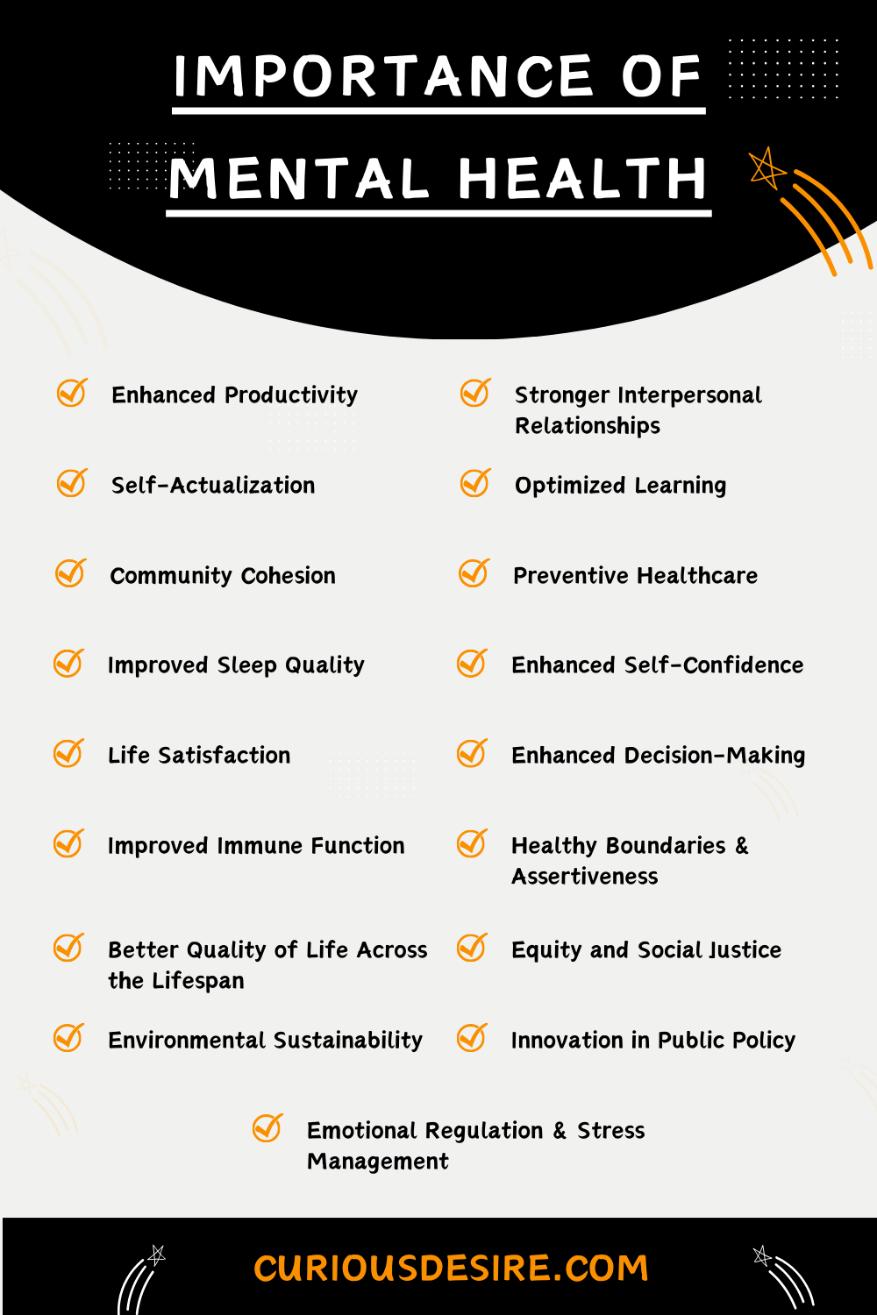In today’s world, mental health is widely recognized as crucial for overall well-being, extending beyond illness to encompass positive resilience and balance.
Awareness of the importance of mental health is essential for healthier individuals and communities, impacting physical health, relationships, and societal harmony.
Let’s discuss it in this article!
Here are the top 5 reasons why mental health is important:
- Optimized Learning and Academic Achievement
- Enhanced Self-Confidence and Self-Efficacy
- Improved Immune Function
- Innovation in Public Policy and Governance
- Equity and Social Justice
[toc]

Mental Health Importance – FAQs
1. What is the importance of mental health?
Mental health is crucial for overall well-being and impacts various aspects of life. It influences how individuals think, feel, and behave, affecting relationships, work performance, and quality of life.
Prioritizing mental health promotes resilience, productivity, and social connections, contributing to a fulfilling and meaningful life.
2. Why is mental health so important?
Mental health is essential because it influences every aspect of a person’s life. It affects physical health, social relationships, productivity, and overall quality of life.
Good mental health enables individuals to cope with stress, navigate challenges, and pursue personal goals, leading to greater happiness and fulfillment.
3. What are the benefits of mental health?
- Enhanced well-being: Good mental health contributes to greater life satisfaction and happiness.
- Improved relationships: Positive mental health fosters healthier and more fulfilling relationships.
- Increased productivity: Prioritizing mental health leads to higher levels of productivity and creativity.
- Better physical health: Mental well-being positively impacts physical health outcomes and immune function.
- Resilience: Strong mental health promotes resilience, enabling individuals to bounce back from setbacks and adversity.
4. What are ways to improve mental health?
- Practice self-care: Engage in activities that promote relaxation, such as exercise, meditation, and hobbies.
- Seek support: Reach out to friends, family, or mental health professionals for support and guidance.
- Manage stress: Develop healthy coping mechanisms and stress management techniques.
- Maintain a healthy lifestyle: Eat nutritious foods, get regular exercise, and prioritize adequate sleep.
- Practice mindfulness: Stay present in the moment and cultivate gratitude and positivity.
5. What are the rules of mental health?
- Prioritize self-care: Make time for activities that promote mental well-being and relaxation.
- Seek support: Don’t hesitate to reach out for help from friends, family, or mental health professionals.
- Practice self-compassion: Be kind to yourself and treat yourself with the same understanding and care you would offer to others.
6. What is the best way to solve mental health?
There isn’t a one-size-fits-all solution for mental health issues. It often requires a combination of approaches, including therapy, medication, lifestyle changes, and social support.
Seeking professional help from a therapist or psychiatrist can provide personalized treatment and support.
7. How can mental health be treated?
Mental health treatment varies depending on the individual’s needs and circumstances. It may include therapy (such as cognitive-behavioral therapy or psychotherapy), medication, lifestyle changes, and support groups.
The goal is to alleviate symptoms, improve coping skills, and enhance overall well-being.
8. What are the key areas of mental health?
The key areas of mental health include emotional well-being, psychological resilience, social relationships, coping skills, self-esteem, and stress management. Addressing these areas promotes overall mental well-being and resilience.
9. How can we prevent mental health problems?
Preventing mental health problems involves promoting resilience, providing education and support, reducing stigma, and addressing risk factors such as trauma, stress, and substance abuse.
Creating supportive environments, promoting healthy coping mechanisms, and fostering social connections can also help prevent mental health issues.
10. How can I increase my mental energy?
To increase mental energy, prioritize activities that promote mental well-being, such as regular exercise, adequate sleep, balanced nutrition, and stress management techniques like mindfulness and relaxation exercises.
Engage in activities that stimulate your mind, such as reading, puzzles, or learning new skills.
11. What is positive mental health?
Positive mental health refers to a state of well-being where individuals are able to realize their abilities, cope with life’s stresses, work productively, and contribute to their communities.
It encompasses emotional resilience, positive relationships, a sense of purpose, and the ability to adapt to change and adversity.


